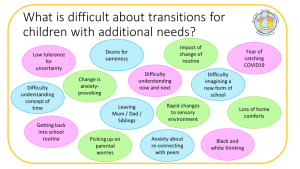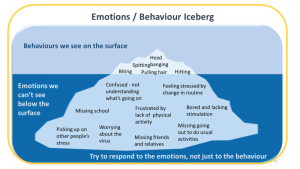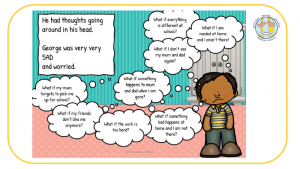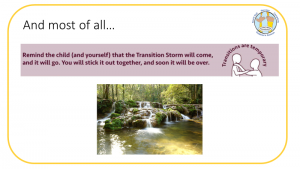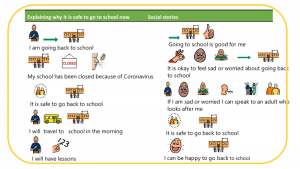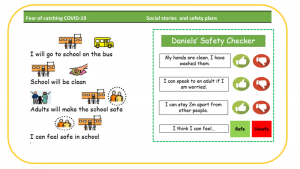Supporting parents / supporting children
If you would prefer the below information in PDF format, please download the file Supporting Parents here.
We want our school to be a secure base for the whole community.
We understand and know that attending school is exciting, we also understand that children can be quite anxious about attending school, especially after significant events and periods of change (such as the pandemic and associated lockdowns). We have been working with Dr Paula Levett to understand and look at ways in which we are able to support parents and children attending school. (Providing Support to parents on their child returning to school Post Lockdown. Dr Rebekah Sutherland – Clinical Psychologist.)
Anxieties will be difficult for the children to explain, but we do understand that change is not good for our pupils. We know the difficulties that could arise too:
We will support the children to understand change and how this will make them feel.
We will:
- Connect with the family
- Help the children to express their feelings
- Listen and take notice
- Pause, help the children to take time to connect with the school and develop trust that we will keep everyone safe
- Most importantly, we will have fun. We will do things they enjoy and take time to laugh.
We are aware that some children might come to school with high anxiety and their behaviours could present in lots of different ways. Therefore, we are mindful of the following information when we are dealing with the behaviours, trying to understand the cause and the emotional difficulties the children might have.
Everyone wants the school community to thrive and grow over the coming years. Like all parents the children’s happiness is our focus and supporting them to explore and develop into secure young people is our ultimate aim.
Our short-term goal is to support you in supporting your child to attend school.
Leaving in the morning:
- Give lots of hugs/kisses goodbye. You could turn this into a game, for example you could say “how many kisses and squeezes would you like today?”.
- Let the child know when you will see them next and what you will do together e.g. I will meet you here at the end of the day, I will pick you up straight after school and we can go and get an ice-cream.
- Have a transitional object e.g. a toy, photograph, picture or special scent, or item that comforts the child.
- Be positive and decisive when saying good-bye to your child.
- Matching items: Give your child something which you also have a copy of, which you can both keep on your person when you are apart e.g. matching home-made wrist bands; or draw a heart, cut it in half and keep a half each.
On their return home:
- A positive greeting after the school separation. This could be a hug, smile, kiss, high-five, a fun handshake, or a special phrase that you use with your child.
- Let your child know that you are glad to see them and that you have thought about them during the day, e.g. “when I was at work I thought about you when I had a cup of tea out of my special mug”.
- If you planned a special activity that you were going to do together after school, it is important to still try and do this even if your child has had a bad day at school. Your child will be better able to take on any thoughts or consequences you have if they feel safe and connected with you.
Useful social stories
When we are together, we will reflect on the positives, the smiles we see everyday and we will celebrate achievements.
Routines will be established, with regular breaks, time to calm, sooth and be grounded.



